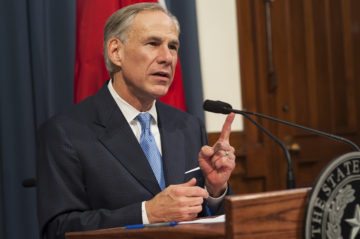Welcome to the 87th Legislative Session. Since the last session came to a close in June 2019, Texas has been hit by an unrestrained pandemic and a crippling economic crisis. Now, under unprecedented circumstances, lawmakers are faced with a number of urgent challenges. The Texas Observer is following along every step of the way.
Go here for last week’s dispatch from the state Capitol.
What We’re Following: Redistricting Delays
It’s official: Texas’ redistricting process is expected to require a special session—likely in the dead heat of summer.
The Census Bureau confirmed Wednesday that—due to delays from COVID-19—the government will not have new Census numbers until April 30. The more detailed demographic data that states need to redraw their political districts won’t be released until after July. That’s two months after the end of Texas’ regular legislative session.
The delay will force Texas lawmakers to convene again later this year to finish the redistricting process. Already a contentious, complicated, and hyper-partisan affair, the state constitution requires the Legislature to draw new state Senate and House maps before the end of the regular session. That could raise potential legal problems.
The stakes are high now that President Joe Biden overturned Donald Trump’s effort to exclude undocumented immigrants from Census counts, which would have disproportionately impacted Texas. After a decade of surging population growth, Texas is expected to be allotted three new congressional seats, bringing its total House delegation to 39. With Democrats’ failed attempt to flip the Texas House, Republicans will have complete control of redistricting for the third decade in a row. After maintaining a safe majority in the state House and relative dominance in the Senate, Republicans are likely to redraw the legislative maps in ways that ensure their grip on power lasts as far into the new decade as possible.
The GOP is just six seats away from taking control of the U.S. House in 2022 and Texas will be a central part of a potential takeover strategy. With Latinos accounting for about two-thirds of population growth over the past decade, Democrats and civil rights advocates are pushing for at least two new Hispanic-majority seats to be drawn in the Dallas-Fort Worth and Houston areas. But with control of the House on the line, expect Republicans to try to grab as many seats as they can.
“They got away with it” in 2010, says Democratic state Rep. Ralph Anchia, who chairs the Mexican American Legislative Caucus, referencing the last time the GOP aggressively gerrymandered maps. “So I suspect that whatever the net increase in seats, they’ll all be Republican.” Texas Republicans are well-versed in the art of using partisan and racial gerrymandering to counteract the forces of demographic change.
On top of that, congressional Democrats in the traditionally deep-blue Rio Grande Valley are also bracing for Republicans to come after them. After Trump fueled a surprising boom in Republican turnout along the border, Congressmen Cuellar, Vicente Gonzalez, and Filemon Vela are concerned that Republicans smell blood in the water and will try to redraw one of their districts in a way that would favor a GOP challenger. Gonzalez, whose district includes most of Hidalgo County, may be a prime target; he pulled in barely 50 percent of the vote in 2020. He told Politico that he’s considering hiring a lawyer who specializes in redistricting to advocate for him in Austin.
Redistricting in Texas is always a heated event—and this time doubly so as lawmakers will have to return to Austin in the dead of summer.
What We’re Reading:

Governor Abbott pushes for strong COVID-19 liability protections for businesses
At a “listening session” with construction industry representatives in San Antonio, Abbott said that he plans to aggressively push lawmakers to enact laws protecting businesses against COVID-19-related lawsuits from employees and customers. A cadre of corporate trade groups and tort-reform advocates like the Texas Civil Justice League—which is currently drafting legislation—have been calling for such measures since the pandemic began. / Texas Tribune
Texas takes on Biden but Republicans keep distance from Attorney General Paxton
The state’s more than 100 GOP legislators were asked if they have confidence in Attorney General Ken Paxton, who has vowed to lead the legal fight against the Biden White House while also under FBI investigation for alleged bribery and abuse of power. Only two lawmakers responded, affirming their support. / Associated Press
When the @JoeBiden admin breaks the law, I take action. I have told @DHSgov to immediately rescind its illegal, unconscionable deportation freeze—or TX will sue.
As AG, I will always put Americans, Texans first—not dangerous aliens who must be deported!https://t.co/anW89QJiPP pic.twitter.com/ehsucOe6Ks
— Texas Attorney General (@TXAG) January 22, 2021
COVID-19 pandemic concerns force Texas Gov. Greg Abbott into a televised State of the State speech
The governor typically gives his State of the State address in the Texas House chamber before all three branches of state government in attendance. But Abbott has opted to give his speech at a small business—without an audience—that will be broadcast across the state during primetime. The governor is expected to announce his “emergency items,” which under the state constitution are the only bills that the Legislature can vote on in the first 60 days of session. / Dallas Morning News
The late Sheldon Adelson’s gambling empire pushes forward with goal to bring casinos to Texas
The 87-year-old casino magnate

died just before the legislative session began, but that hasn’t slowed Las Vegas Sands’ aggressive campaign to convince lawmakers to open their state up for casinos. The company is spending as much as $4.5 million on a stable of 51 lobbyists—easily one of the biggest corporate lobbying operations in the state. While the state’s stronger-than-expected revenue projections relieve pressure on lawmakers to find new streams of revenue, Las Vegas Sands is pitching casinos as a boon for long-term economic development. / Texas Tribune
All Hat, No Cattle
The Texas Legislature is known for its outlandish members, ludicrous antics, and right-wing flare-ups. Here’s your weekly dose.
After four years of Trumpism, Governor Greg Abbott finally has a useful political foil back in the White House.
On Thursday, the governor traveled to the oil-and-gas hub of Midland “to make clear that Texas is going to protect the oil and gas industry from any type of hostile attack from Washington, D.C.,” and warned that the state is “not going to stand idly by and watch the Biden administration kill jobs” in the Permian Basin. He pointed to Biden’s halting of the Keystone XL pipeline and his temporary freeze on new drilling leases on federal land as proof that he’s out to kill the state’s energy jobs. But neither move has much effect on Texas, which would see little economic benefit from the Keystone pipeline and has almost no federal land to drill on.
Abbott also signed an executive order directing every state agency to “use all lawful powers and tools to challenge any federal action that threatens the strength, the vitality or the independence of the energy industry in Texas.”
While Abbott focused most of his ire on the Biden administration, he still managed to launch yet another front in his war on local control. Referencing San Francisco’s recent decision to ban the use of natural gas in new buildings, Abbott pledged support for state legislation that would prohibit Texas cities and counties from “banning natural gas appliances.”







